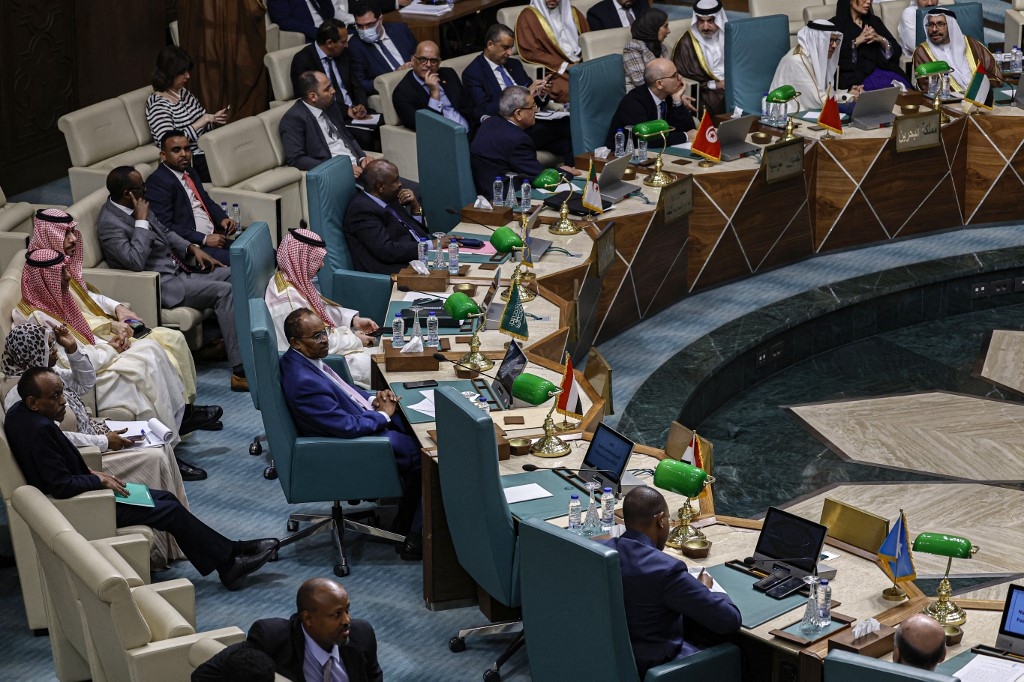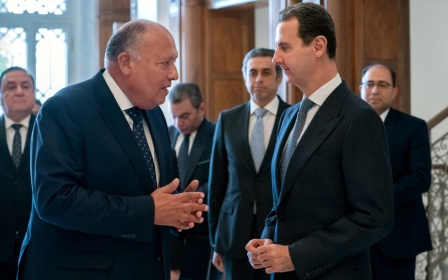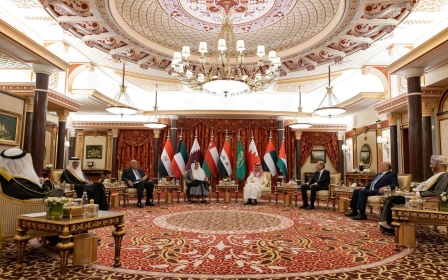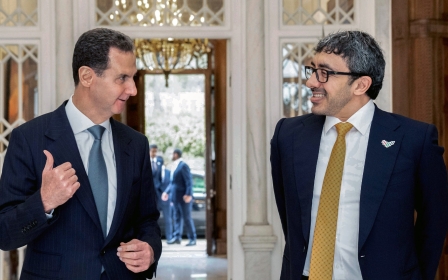Arab League readmits Syria as relations with Assad normalise

Arab League foreign ministers on Sunday adopted a decision to readmit Syria after more than a decade of suspension, a league spokesperson said, consolidating a regional push to normalise ties with President Bashar al-Assad.
The decision said Syria could resume its participation in Arab League meetings immediately, while calling for a resolution of the crisis resulting from Syria's civil war, including the flight of refugees to neighbouring countries and drug smuggling across the region.
It was taken at a closed meeting of foreign ministers at the Arab League's headquarters in Cairo.
However, Qatar, an outspoken opponent of Assad, said on Sunday it would not normalise relations with the Syrian government despite its readmission to the league.
Arab League Secretary-General Ahmed Aboul Gheit said that Assad could attend an Arab League summit scheduled to be held in Saudi Arabia later this month "if he wishes to".
New MEE newsletter: Jerusalem Dispatch
Sign up to get the latest insights and analysis on Israel-Palestine, alongside Turkey Unpacked and other MEE newsletters
Responding to a question over whether Assad could participate at the summit, due to be held in Riyadh on 19 May, Aboul Gheit told a news conference in Cairo: "If he wishes, because Syria, starting from this evening, is a full member of the Arab League, and from tomorrow morning they have the right to occupy any seat.
"When the invitation is sent by the hosting country, the Kingdom of Saudi Arabia, and if he wishes to participate, he will participate," he added.
While Arab states, including the United Arab Emirates, have pushed for Syria and Assad's rehabilitation, others, including Qatar, have remained opposed to full normalisation without a political solution to the Syrian conflict.
'Challenging process'
Some have been keen to set conditions for Syria's return, with Jordan's foreign minister saying last week that the Arab League's reacceptance of Syria would only be the start of "a very long and difficult and challenging process".
Sunday's decision said Jordan, Saudi Arabia, Iraq, Lebanon, Egypt and the Arab League's secretary-general would form a ministerial contact group to liaise with the Syrian government and seek "step-by-step" solutions to the crisis.
Practical steps included continuing efforts to facilitate the delivery of aid in Syria, according to a copy of the decision seen by Reuters.
Syria on Sunday called for Arab states to show "mutual respect", after the Arab League vote.
Arab states should pursue "an effective approach based on mutual respect", the Syrian foreign ministry said in a statement that also stressed the "importance of joint work and dialogue to undertake the challenges facing Arab countries".
Syria's membership of the Arab League was suspended in 2011 after a crackdown on street protests against Assad that led to a devastating civil war, and many Arab states pulled their envoys out of Damascus.
Saudi Arabia long resisted restoring relations with Assad but said after its recent rapprochement with Iran - Syria's key regional ally - that a new approach was needed with Damascus.
Qatar and Assad
The United States criticised Syria's readmission into the league, saying Damascus did not merit being brought back into the group, while raising questions about the willingness of Assad to resolve the crisis resulting from Syria's civil war.
The US believed, however, that Arab partners intend to use the direct engagement with Assad to push to solve the country's long-standing crisis and that Washington was aligned with its allies on the "ultimate objectives", a State Department spokesperson said.
Qatar's foreign ministry spokesman, Majed al-Ansari, told the state Qatar News Agency that his government would not be "an obstacle" to the Arab move but any individual normalisation would be linked to political progress that "fulfils the aspirations of the brotherly Syrian people".
Assad's government must "address the roots of the crisis that led to its boycott, and to take positive steps towards addressing the issues of the Syrian people," the spokesman added.
Qatar has given significant support to Syrian opposition groups that have taken over the Syrian embassy in Doha.
Ansari condemned to the Qatari media what he called "crimes" by the Damascus government and added that: "We need a real price to be paid to the Syrian people."
Middle East Eye delivers independent and unrivalled coverage and analysis of the Middle East, North Africa and beyond. To learn more about republishing this content and the associated fees, please fill out this form. More about MEE can be found here.




